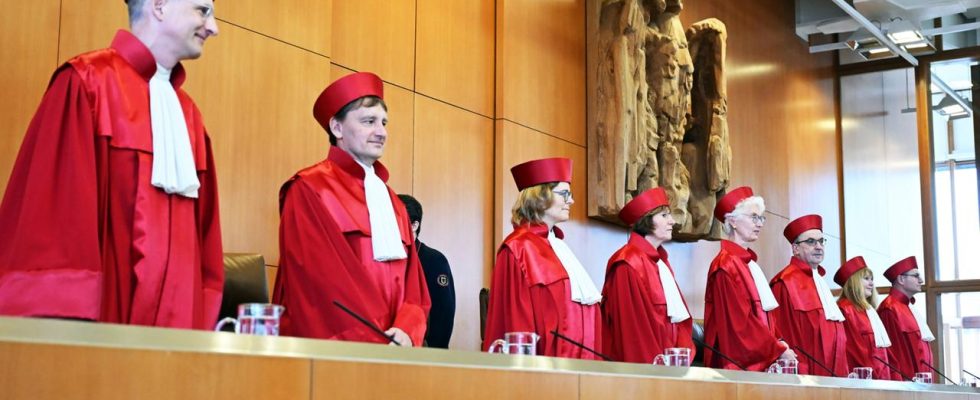faq
In order to better protect the Federal Constitutional Court from influence, the traffic light wants to change the Basic Law. However, the government needs the Union for this – the talks continue today. What plans are being discussed?
After some back and forth between the CDU and CSU, representatives of the Union faction are now talking to members of the traffic light coalition about better protection for the Federal Constitutional Court.
What is the problem?
The Federal Constitutional Court has proven itself as an independent guardian of the Basic Law since it began its work in 1951. Citizens turn to the Karlsruhe court to enforce their fundamental rights. The opposition values the judges as a corrective to those in power.
But autocratic forces have no increased interest in such an institution – experiences in other countries have shown this. In Poland, the previous government tried to eliminate the Constitutional Court as a supervisory body by making changes to the law. Similar attempts and efforts could be observed in Hungary, Poland, Turkey and most recently in Israel.
Since many of the rules that govern the work of the Federal Constitutional Court are contained in a simple law, there are fears that this could also happen in Germany – should the majority shift accordingly. Because simple laws can be changed with a simple majority. Unlike the Basic Law – this requires a two-thirds majority.
However, this requirement for a two-thirds majority also has its pitfalls. It gives factions in the Bundestag that individually or collectively receive more than a third of the votes a blocking minority. They could block necessary changes or make concessions. A two-thirds majority is also required to elect constitutional judges.
Which Suggested solutions are discussed?
For several years now, legal circles have been thinking about how the Federal Constitutional Court could be better protected from such disempowerment. This discussion has now also reached the political agenda in Berlin. After a short time there she was in danger of being drowned in the party-political petty politics. But now the traffic light and Union parties have pulled together. Because of the required two-thirds majority, they could only tackle a change to the Basic Law together. The Federal Ministry of Justice has invited people to talks today and, at the request of the Union, has presented a working draft as a basis.
Thereafter, the status of the court as a constitutional body would be anchored in the Basic Law. Just as decisions by the Federal Constitutional Court are binding or have the force of law. In addition, central structures would be included: These stipulate that there are only two senates with eight judges each, the twelve-year term of office and the age limit of 68 years for judges as well as the exclusion of re-election.
This is intended to prevent one-sided political influence on the court – for example by electing additional, loyal judges or reducing the term of office or age limit in order to get rid of unpopular judges.
What other suggestions are there?
There is also discussion about enshrining in the Basic Law that judges must be elected with a two-thirds majority – this has so far only been regulated in a simple law. This point is not included in the working draft. It is in fact one of the most complicated points considered sensitive within the Union. It raises the follow-up question: How to deal with a faction that has more than a third of the votes and thus blocks the election of a constitutional judge or makes concessions. There are different proposed solutions for this. But there is always something wrong with them.
The state ministries of justice, which have been working on their own draft law for some time, have suggested that in the event of a blockade in the Bundestag, the Bundesrat would take over the blocked election of judges and vice versa. Already today, half of the judges are elected by the Bundestag and half by the Bundesrat. Within the Union, they recently described such an exchange of the electoral body as “panic”.
In addition, there are considerations in the Basic Law to regulate that the Federal Constitutional Court may exercise a veto if something in its working methods is to be legally changed – for example, the requirement should be made that cases must be processed not according to importance, but according to the date of receipt.
What are the chances for the project?
The challenge in all of these considerations is not to overload the Basic Law and to preserve the necessary flexibility of a simple majority where it might be necessary in practice in the future.
The Federal Ministry of Justice’s proposal focuses on key points, which makes an agreement more likely. Whether the talks fail again will also depend on whether those involved manage to maintain the agreed confidentiality.
In order not to get caught up in the election campaign, the project would at best have to reach the Bundestag before the summer or at least this year. If you come to the conclusion that changes are needed at all. Just a few weeks ago, the Union came to the conclusion that these were “currently not absolutely necessary”.

